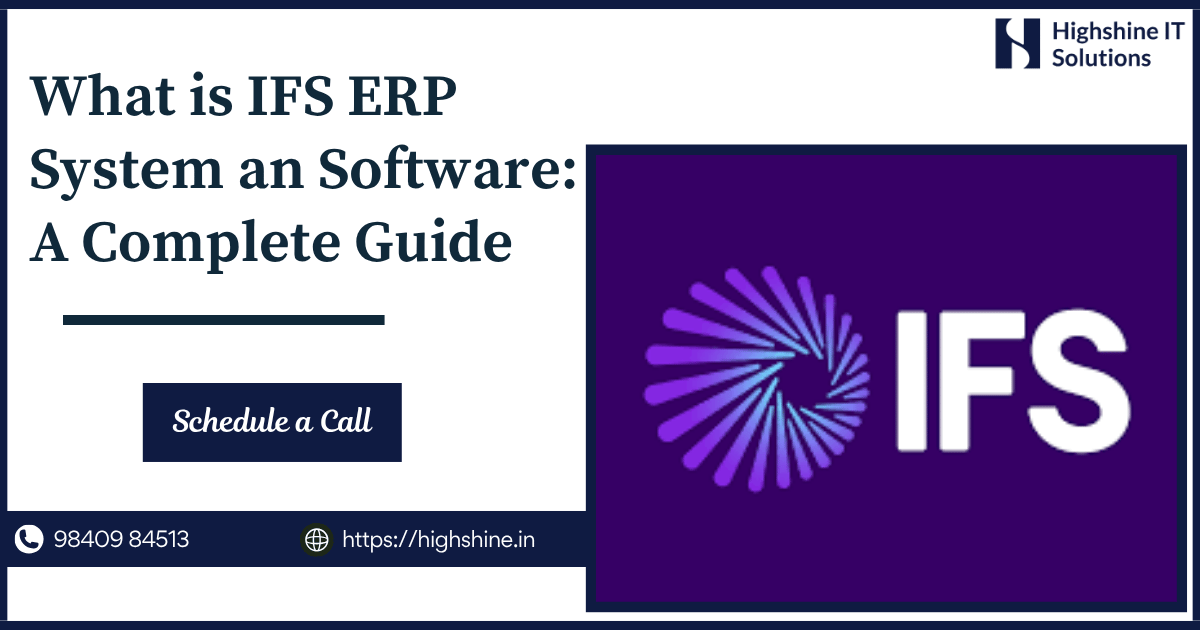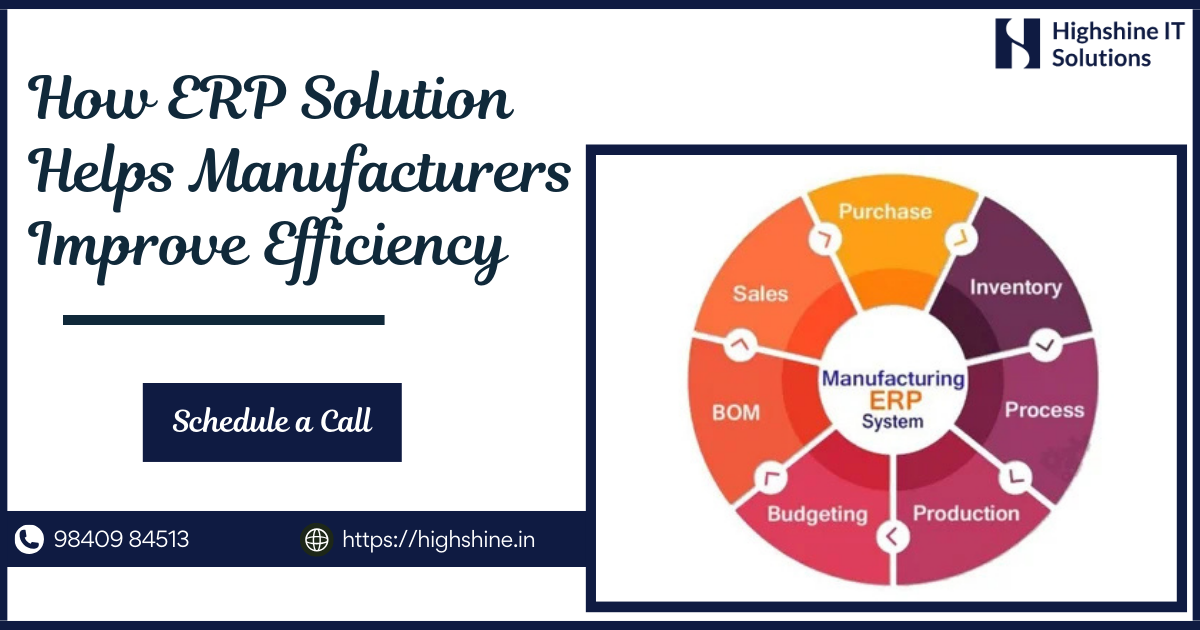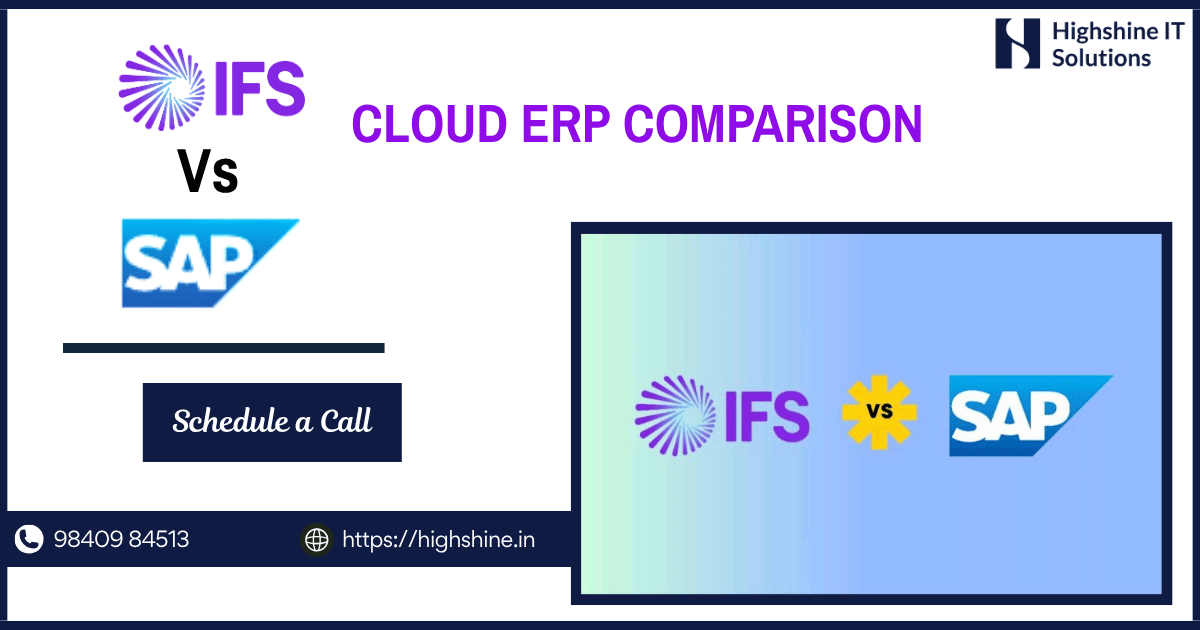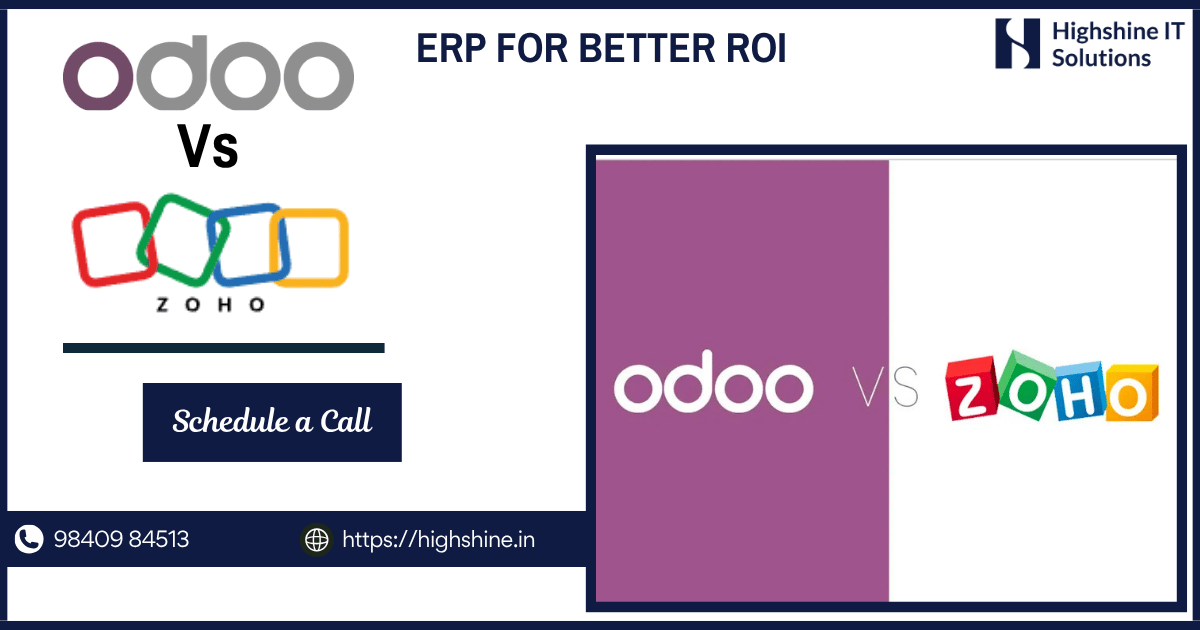
The Ultimate Guide to Know about IFS ERP System And Software Software
In a rapidly developing business world, ERP software is getting viral, and more companies want to manage and automate various business functions like finance, supply chain, manufacturing, and human resources. Among the various ERP software, IFS (Industrial and Financial Systems) Enterprise Resource Planning software has gained more consideration and recognition from many consumers and business owners. That empowers businesses to upgrade their core processes, drive growth, and achieve strategic business goals. But what exactly is IFS ERP? What makes it an outstanding, powerful enterprise software solution in a crowded business market?
Known for its flexibility and ability to manage business-specific needs, IFS has grown into a prominent option for various organisations and companies seeking cutting-edge tools for Enterprise Resource Planning (ERP), Enterprise Asset Management (EAM), and Field Service Management (FSM). In this guide, it is necessary to understand everything about IFS ERP software and how it works, as well as its definition, features, benefits, deployment options, and more.
What is IFS ERP Software?
IFS stands for Industrial and Financial Systems, and ERP is Enterprise Resource Planning. This unified software is developed to manage, streamline, and optimise the business process on a vast level. Its handling and streamlining process includes various business functions like finance, procurement, inventory management, human resources, and customer relationship management, all integrated into a single cohesive system, offering real-time information, automation, and analytics. IFS ERP software assists businesses in operating more efficiently and making informed decisions.
The first IFS ERS software is focused on creating software solutions for manufacturers and the manufacturing industry. Over the decades, the system has been designed as a comprehensive suite across various sectors, including manufacturing, distribution, aerospace and defence, energy, utilities, and service management. This flexibility allows organisations of different sizes and sectors to seamlessly adapt and integrate IFS ERP into their operations.
The company’s goal has always been to establish a flexible, reliable ERP system capable of adapting to the evolving needs of businesses globally. IFS ERP software has recently become one of the most reputable and prominent software solutions, with thousands of customers across multiple industries. IFS ERP software continues to grow, incorporating cutting-edge and futuristic technologies like cloud computing, artificial intelligence (AI), and the Internet of Things (IoT) to keep businesses ahead of the curve.
Essential Features to Understand about IFS ERP Software
The IFS ERP system is renowned for its holistic set of features encapsulating every business management insight. Some essential features include:
- Unified Modules
The key aspect to consider in the IFS ERP system is that it is an integrated system. It includes various modules for financial management, human resources, supply chain, inventory management, procurement, and more. It offers many upgrades and optimisations to businesses and their growth, with a comprehensive view of their operations.
The IFS ERP system provides industry-specific functionalities that cater to the unique needs of its target industries, along with its desired modules. This state-of-the-art approach confirms that businesses have access to the specific tools and aspects they need to succeed.
- Real-time Information and Analytics
With the IFS ERP system, businesses can rapidly assess real-time information to make data-driven decisions. It provides robust reporting, dashboards, and integrations with business intelligence tools. Some reporting and analytics features to know:
- Real-time Reporting
- Drill-down Capabilities
- Customizable Reports and Dashboards Establishment
- Data Filtering and Sorting
- Data Visualisation and Analysis
- Report Scheduling and Distribution
These features help you to understand and manage the performance, identify trends, and make practical decisions.
- Accessibility and Personalisation
The IFS ERP system stands out for its exclusive accessibility and customisation capabilities across various modules. This flexibility allows it to be finely tuned to cater to the requirements of diverse industries, confirming that businesses receive the correct functionality tailored to their unique necessities.
In addition, IFS ERP boasts system error or problem-free integration with other systems, enabling businesses to connect and streamline their many operations effortlessly. Its highly scalable nature further empowers organisations to adjust the system according to their evolving needs, adapting to growth and changes in the market landscape.
- On-Premises, Cloud-Based, and Hybrid: Deployment Options
The IFS ERP system provides excellent deployment models like cloud, hybrid, and on-premises deployment options, giving businesses the flexibility to choose the setup that best suits their requirements and needs.
There are some deployment models for the IFS ERP system:
- On-Premise: This requires the IFS ERP system installed and used on the company’s server. This provides vast control over the system and its infrastructure, but also needs some start-up investment and routine maintenance costs.
- Cloud: In this model, the IFS ERP paid software is hosted and managed by a third-party provider in a cloud environment. This provider offers the finest flexibility, scalability, and cost-effectiveness, as industries and companies only pay for the cloud resources they use.
- Hybrid: This model combines elements of both on-premise and cloud deployments.
- Mobile Accessibility
The IFS ERP software provides innovative mobile applications designed to empower employees by granting them instant access to crucial business information and enabling them to execute essential tasks while on the move. This capability remarkably improves holistic productivity and efficiency in the workplace.
- User-Friendly and Easy-to-Access Interface
The IFS ERP system has been developed with a simple and easily accessible interface that makes it feasible for technical and non-technical users to navigate and operate.
IFS ERP’s user-friendly interface is established by its innovative and intuitive design and ease of navigation. The uncomplicated interface uses a constant structure and plot, with prominent and reliable menus and icons that provide easy access to necessary features. The application’s modern design allows users to optimise their workspace and prioritise related information.
- Role-Based Dashboards: The IFS ERP system offers customisable dashboards to achieve the specific user roles, briefly presenting key performance indicators (KPIs) and relevant data.
- Context-Sensitive Menus: These dynamically adjusted menus are created based on the user’s prior task and context, lessening the unwanted navigation and improving effectiveness and efficiency.
- Search Functionality: Potential search capabilities allow users to locate information quickly.
Benefits You Should Know While Using IFS ERP Software
Utilising the IFS ERP software provides a comprehensive set of benefits to the business and its growth compared to using other ERP systems. Some of the most noticeable benefits are:
- Improvisation in Manufacturing Efficiency:
The IFS ERP system minimises the need for manual tasks and errors and increases the workflow’s speed through the process of automating and streamlining. It provides businesses with specific specialities and functionalities that drive the requirements of targeted companies and industries. The well-developed sector has access to the tools and insights it needs to succeed.
- Better Decision-Making:
Real-time data, information, and potential analytics enable powerful businesses to make swift and well-informed decisions. This capability improves their responsiveness to rapidly developing market changes and shifting consumer or client demands, ultimately driving success and competitiveness in today's dynamic business environment.
- Cost and Budget Savings
In terms of benefits, it is the most profitable and essential. It can help businesses achieve affordable costs and enhance profitability by enhancing efficiency, automating processes, managing business processes, and reducing operational inefficiencies. The cloud deployment model in the IFS ERP system reduces the need for on-premises infrastructure, further lessening costs.
- Improved Collaboration
A unified platform enhances and enables potential employees from various departments to collaborate effortlessly, fostering effective communication and effortless information sharing.
IFS ERP harnesses potential and efficient technologies, including cloud computing, artificial intelligence (AI), and the Internet of Things (IoT), to amplify its functionalities. This cohesive manner enables businesses to automate workflows, acquire real-time insights, and improve decision-making processes.
- Scalability
The IFS ERP system is scalable, which means it can grow with your business. As your organisation expands, the software can be adapted to meet new requirements and reach the desired expansion. Compared to other ERP systems, IFS ERP software effortlessly integrates and evolves. It is also highly scalable, allowing businesses to adapt the system as their needs evolve.
- Compliance and Risk Management
THE IFS ERP system provides businesses a holistic suite of tools and techniques designed to efficiently optimise the risk and maintain compliance with various industry regulations. Confirming adherence to legitimate standards empowers organisations to navigate the challenging regulatory environments confidently and efficiently.
How IFS ERP Differs from Other ERP Software
In ERP (Enterprise Resource Planning) software, many choices are available. Apart from various ERPs, the IFS ERP system stands out in the market with several key aspects. Some important considerations and comparisons between IFS ERP software and other ERP systems. They are:
- It is mainly renowned for being the best industry-specific software. In the various options of ERP software available in the market, the IFS ERP system is significant in providing the utmost tailored solutions that are the key value for business growth and development in various sectors. Those sectors, like aerospace, manufacturing, energy, and construction, confirm that companies and businesses obtain the functionalities and key specialities.
- Another vital aspect is that you should always prepare to face the complex operations with confidence and precision of deliverables. An industry or business with an extensive IFS ERP is advantageous and inevitable. This IFS ERP software is specially made with the latest and cutting-edge capabilities in primary areas like asset management, project management, and supply chain optimisation, addressing the pressing challenges faced in such environments.
- A frequent drawback among the various ERP software is their rigidity and complexity, posing challenges when required optimisations are needed. Although the IFS ERP system is characterised by high flexibility, it allows businesses to choose only the modules they need. Moreover, industries or companies can add new functionalities as their requirements change, fostering adaptability within their operations.
- Cohesiveness in the clouds and other deployments is a wholly optimised technology; the IFS ERP improves the accessibility to data for industries and companies. This cloud-based approach promotes remote access and confirms that automatic updates and maintenance occur effortlessly, thus lessening operational disturbances.
IFS ERP System: Modules
The IFS ERP system defaults to having a variety of modules developed and designed to support many aspects of business management and relevance. Some of the essential modules to understand include:
- Financial and Budget Management
Managing finances and budgets is essential in any organisation. In the IFS ERP system, managing finances and budgets to control or avoid financial crises is crucial. This is the most valuable and profitable module, which helps many industries, companies, or businesses to manage their financial operations, including accounting, transaction maintenance, reporting, billing, and budgeting. It provides helpful features like general ledger, accounts payable and receivable, cash flow management, and more, which are crucial for money and budget management. It is mainly purposeful for avoiding issues that arise from financial mismanagement.
- Supply Chain Management
Another considerable module that streamlines procurement, inventory management, and supplier relationships, confirming prominent inventory levels and lessening the unnecessary costs. It primarily focuses on updating or managing the flow of goods and services through transactions. It also includes many essential things related to supply chain management, from procurement to delivery. It provides inventory management, purchasing, warehouse management, and transportation functionalities. This can be more like logistics and transportation with prior functionalities. So, it has been a mandatory module in the IFS ERP system.
- Manufacturing and Production
The IFS ERP system is mainly established for manufacturers and manufacturing purposes; this module assists with planning from pre-production to post-production, scheduling the time frames, controlling and inspecting inventory and deliverables, and the process execution pattern and process. It includes various helpful features for quality management and maintenance for future enhancements. It has been established that manufacturing organisations should focus on offering multiple functionalities like those mentioned above.
- Human Resources (HR)
Every organisation contains this human resource module with essential functionalities. Like others, the IFS ERP system has this mandatory module for managing employee information, such as employee data, payroll, benefits, recruitment, performance, talent management, and training. Meanwhile, various organisations are moving towards attendance tracking with multiple gadgets, recruitment, and performance management.
- Customer Relationship Management (CRM)
This CRM module in the IFS ERP system for business manages and establishes more interactions with customers and employee’s relationships, focusing on improving sales and revenues, marketing practices, and increasing the range, along with customer services.
- Asset Management
This module in the IFS ERP system offers businesses a complete solution for tracking and maintaining their physical assets, including machinery, equipment, and vehicles. It confirms that every asset is accounted for and managed efficiently, improving operational effectiveness and reducing downtime.
What Industries are Benefiting from the IFS ERP System?
The IFS ERP system is renowned for providing benefits and business development to several targeted industries. Some of them are getting various advantages from using the IFS ERP software:
- Manufacturing
The IFS ERP system is mainly established to streamline the manufacturing process and development, from planning production events, planning, inventory management, quality control, supply chain management, optimisation, and timing. It helps manufacturers enhance the industry’s efficiency, reduce costs, and improve product quality.
- Aerospace and Defence:
The IFS ERP system’s latest and cutting-edge features support aerospace and defence industries by managing projects and confirming regulatory compliance. This industry requires well-developed ERP solutions like IFS ERP software to manage and optimise complex projects and maintain resources. The IFS ERP system offers important functionalities like engineering change management, program management, and compliance tracking.
- Energy and Utilities:
The IFS ERP system assists energy industries in optimising their supply chains, maintaining assets, and tracking real-time performance. The energy and utilities sector faces significant and seamless challenges, including asset management, regulatory compliance, and operational efficiency. THE IFS ERP system offers tools for managing assets and operations and confirming regulatory compliance.
- Construction-Based Industries:
The IFS ERP system provides project management tools that help construction companies manage production, schedules, budgets, and resources.
- Service-Based Industries:
The IFS ERS software promotes service providers in managing contracts, field operations, and customer relationships. IFS ERP software supports service businesses with field service management, CRM, and project management, improving customer satisfaction, service delivery, and optimising resources.
The Future of the IFS ERP System
In the manufacturing enterprise world, ERP software is related to the market, which will continuously evolve and upgrade, as well as the IFS ERP software. As the technology upgrades and evolves, some noticeable key trends that shape the evolution of IFS ERP software include:
- AI and Machine Learning Integration:
In the IFS ERP system, the AI-ML is more committed to making the classic manufacturing software an up-to-date modernisation. IFS ERP software has been unified with AI to automate the process of decision making, update and modify the supply chains, and improve predictive analytics. In the future, AI will significantly impact forecasting for production, maintenance scheduling, intelligent inventory management, automated customer service, and customer relationship management.
- Cloud Upgradation:
These are more familiar with incorporating into the IFS ERP systems. It is mainly for the continuous expansion of storage and security. Cloud-based, which means it is a deployment module, the IFS ERP system’s flexibility, scalability, and cost-effectiveness make it attractive for businesses and its development. IFS ERP will improve cloud capabilities, confirming effortless updates and high availability. This includes investments in its IFS Cloud platform, offering a modern and agile ERP experience.
- IoT and Data Connectivity:
The Internet of Things (IoT) merges physical devices with the digital world. IFS ERP system leverages IoT by integrating sensors and connected devices for real-time asset monitoring, effective inventory tracking, and predictive maintenance. IFS ERP software enables effortless integration with IoT to gather real-time data and improve visibility across the supply chain, leading to profitable inventory management, developed production, and enhanced asset performance.
- Improved User Experience (UX):
As user experience in IFS ERP software is considered more crucial, IFS will improve its interface to be more intuitive and easier to access. Upgraded features like voice-assisted navigation, the latest reporting tools, and personal dashboards will become more convincing and comfortable, providing a more user-friendly experience. IFS ERP software aims to enhance its ERP solutions by modernising interfaces, offering customised dashboards, and lessening the manufacturing processes more efficiently and effectively.
Conclusion
The IFS ERP system is a reliable and flexible enterprise resource planning solution, transforming start-up business operations into large organisations. With potential features, industry-driven solutions, and real-time data analytics, it assists companies in streamlining processes, enhancing collaboration, lessening the costs, and making informed decisions. The IFS ERP system provides a feasible platform tailored to unique organisational needs in manufacturing, aerospace, energy, or other industries. Integrating financial management, supply chain, HR functions, and customer relationships into a cohesive system improves efficiency and productivity.
While executing IFS ERP software can present challenges, its benefits outweigh the obstacles. With careful planning and support, businesses can harness the power of IFS ERP software for long-term success. IFS ERP software is a prominent solution worth exploring if considering an ERP system. Its well-developed features, industry-focused modules, and strong global presence make it a top choice for organisations looking to modernise operations and obtain future business management.






